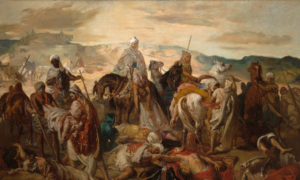Ibn Khaldun: The Thinker Who Redefined History and Society

Ibn Khaldun (1332–1406) was a pioneering historian, sociologist, and philosopher whose ideas shaped modern historiography and social sciences. Born in Tunis, he excelled in Islamic studies, politics, and economics. His masterpiece, The Muqaddimah, introduced concepts like the rise and fall of civilizations, economic cycles, and social cohesion. His works influenced scholars across disciplines, earning him the title “Father of Sociology.” This article explores his early life, major contributions, lasting legacy, and enduring relevance today.
Early Life and Education
Ibn Khaldun was born in 1332 in Tunis, North Africa, into a distinguished Andalusian family with a strong scholarly and political background. His family’s aristocratic lineage granted him access to some of the best educators of the time. He received rigorous training in Islamic sciences, law, philosophy, mathematics, and literature. Growing up in a politically dynamic era, he was exposed to intellectual circles in the Maghreb and Andalusia, shaping his deep understanding of governance and society.
Major Contributions
- The Muqaddimah: Introduced a scientific approach to history, analyzing the rise and fall of civilizations through economic, social, and political factors.
- Historiography and Sociology: Developed a systematic method of studying history, emphasizing social cohesion (asabiyyah), cyclical patterns in civilizations, and the impact of the environment on society.
- Economics and Political Theory: Explored taxation, labor, and economic cycles, arguing that excessive taxation weakens productivity and societies follow a natural cycle of growth and decline.
- Philosophy and Education: Discussed human development, the role of knowledge in society, and the importance of education in shaping intellectual and moral progress.
- Role in Politics: Served as a statesman, diplomat, and judge, applying his theories to real-world governance and state-building.

Legacy and Influence
Ibn Khaldun’s works greatly influenced later historians and scholars, shaping the fields of historiography and sociology. His ideas on historical cycles and social cohesion inspired thinkers such as Arnold Toynbee and Oswald Spengler.
Recognized as the “Father of Sociology” and a pioneer of historiography, his systematic approach to history laid the groundwork for modern social sciences. His economic theories on taxation and governance also influenced later political economists.
His legacy remains relevant today, with scholars applying his theories to contemporary issues in politics, economics, and social development. His insights continue to shape modern historical and sociological analysis.
Conclusion
Ibn Khaldun’s pioneering contributions to historiography, sociology, and economics establish him as one of the most influential thinkers of the Islamic Golden Age. His scientific approach to history and social structures laid the foundation for modern social sciences, earning him recognition as the “Father of Sociology.”
His ideas on civilization, economics, and governance remain relevant today, offering valuable insights into societal development. Exploring his works, especially The Muqaddimah, provides a deeper understanding of history, politics, and human behavior.



